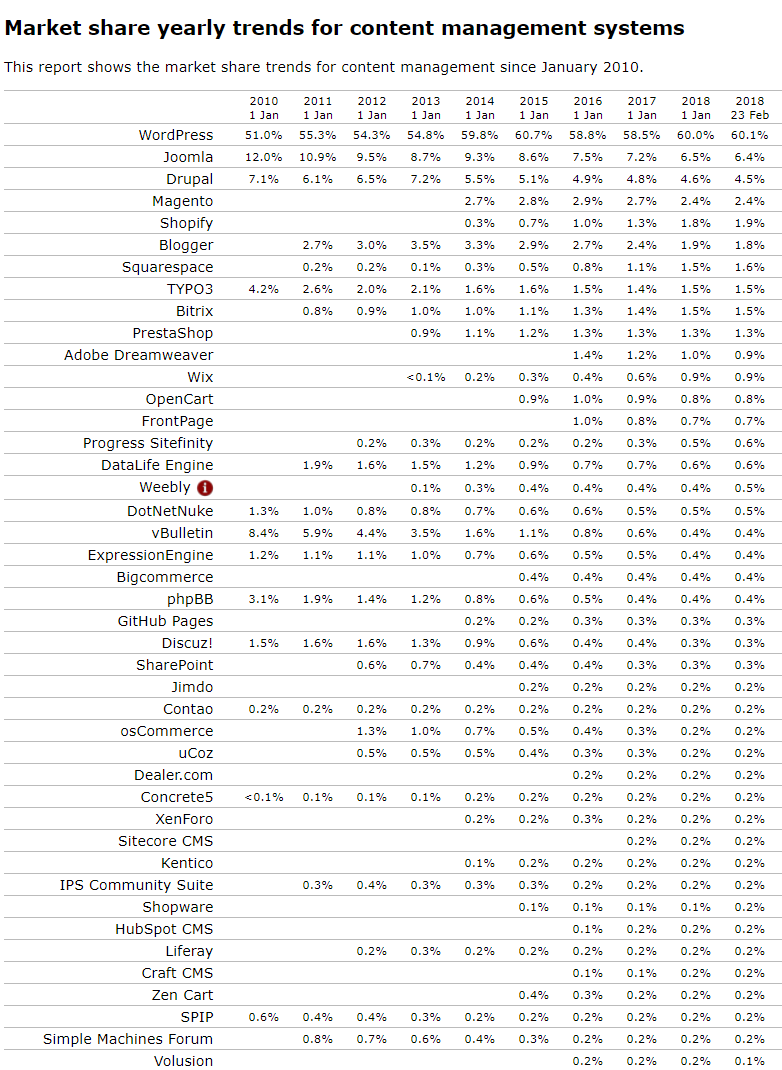February 23, 2018
CMS trends and market shares
The selection of CMS (content management system) should take into account a worldwide statistics, regarding the usage of such systems: what types of CMS are the most commonly used, which ones are gaining their popularity or just the opposite – becoming less popular.
When deciding on the CMS for your website you can consider both subjective and objective factors. Examples of subjective factors are personal experience and expert judgement. Objective factors are statistical data. That’s what we are going to discuss in this article.
Benjamin Disraeli, the former British Prime Minister, once said a phrase that was later popularised by Mark Twain: “There are three kinds of lies: lies, damned lies, and statistics. ” As far as I understand, it was said not about statistics itself, but about the dubious methods of data acquisition.
For example, in the mid-noughties in the daily Latvian newspaper “Chas” (according to author’s personal experience) it wasn’t uncommon thing to interview two (!) people to compile a portrait of the readership for the TNS Latvia research agency. And on the basis of this survey they made a conclusion about the readership of the whole city with a population of several tens of thousands of people. Such kind of “statistics” are actually worse than “damned lies”.
On the other hand, there are the “bare facts”: the number of newspaper subscribers, volume of sales, profit margin, etc. Such facts can be safely used for informed decision-making unlike the facts mentioned above.
CMS statistics
What is CMS statistics? It includes data on the number of users of a particular content management system. This information can be interesting not only as a “picture” (i.e. the number of users in the given time moment), but also in some specific time period: then it is possible to see tendencies.
One of the best sources with information on the use of various technologies in the Internet is W3Techs website. There you can find such table:
What do we see? First, a clear leader: the market share of WordPress CMS is much greater than any other. Secondly, there are two obvious tendencies: strong growth of the WordPress CMS (1) market share and decline in the market share of the next three competitors (2).
What’s noteworthy: in 2010, the ratio of the market shares of WordPress to the nearest competitor Joomla was approximately 4:1; in February 2018 this ratio was closer to 10:1. So the gap has increased two and a half times!
What conclusions can we draw?
1. More and more website administrators choose WordPress more often, and less often – other content management systems
2. It seems that the WordPress market share is growing at the expense of other competing CMS: perhaps the website owners are switching from Joomla, Drupal and other CMS to WordPress
3. It seems that in the foreseeable future, WordPress remains the most popular CMS
What conclusions should not be done?
At first glance, it may seem that since WordPress is the most popular CMS in the world (which is ten times more popular than nearest competitor), this CMS is the best. And if this CMS is the best, it is best for my website.
These conclusions may seem logical, but they are not always correct. Why so? First, because the criteria “better-worse” is often a subjective, rather than objective (and in this article we’re talking about objective facts), and secondly because there are so many different websites: what is good for a corporate site is not always suitable for a large online store, and certainly not suitable for an online service.
So if you are faced with the question of what CMS to choose for your website, it may be useful not only to see the global statistics of the CMS usage (which is good as it gives a general idea), but also to learn, what CMS are suitable for your business.




